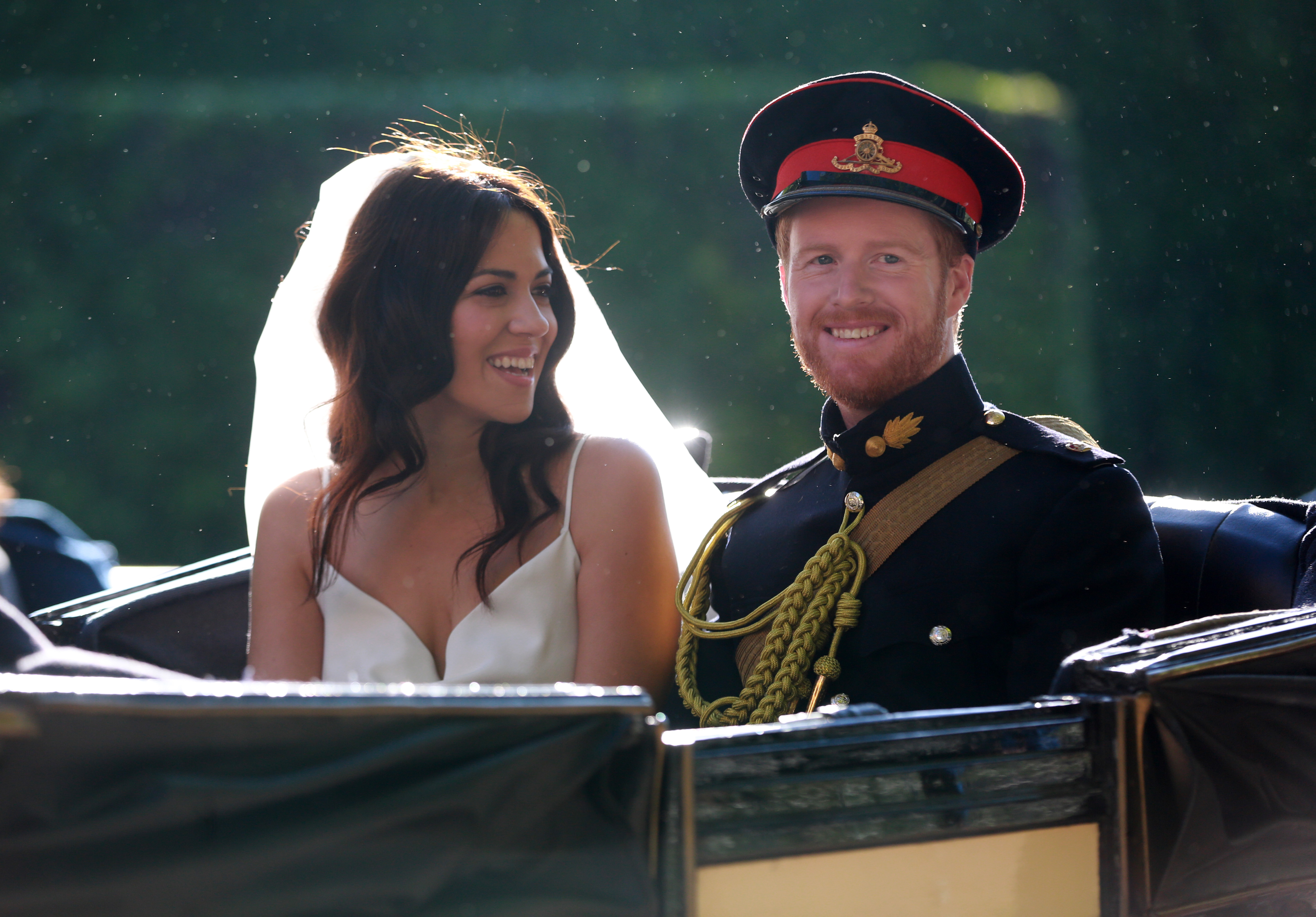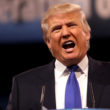On May 19, 2018, more than 50 million Americans and Britons turned on their televisions to watch Meghan Markle, a freckled, brunette American previously best known for co-starring in the basic-cable legal drama Suits, marry Henry Charles Albert David No-Last-Name, also known as the Duke of Sussex, an equally freckled, very ginger English veteran who (barring a series of unlikely but likely terrible events) will never be the King of England. The Nielsen ratings—which don’t include the hundreds of millions who streamed the wedding online, watched in one of the other 193 countries in the world, or caught at least one of the Groundhog Day–style loops probably still airing on cable television—represent twice the number of Americans who tune in to Game of Thrones or The Big Bang Theory each week and more than four times the viewership that Suits saw at the height of its popularity. This union clearly mattered, and matters, a lot to a lot of people.
The reasons why are complex and manifold. Markle is divorced, a “Yank,” a commoner, a vocal feminist, and slightly older than her husband, Prince Harry. And then there is the fact that Markle’s mother is African-American, while her father is European-American, which makes her, at least by her own reckoning, biracial.
Because of all these factors, many journalists and social media “influencers” have decided that Markle must serve as sign and source of a revolutionary change in the British monarchy. From the moment the two started dating until probably two seconds ago, someone somewhere has been dissecting and/or debating everything from the color and cut of Ms. Markle’s dresses to the way she sits to the lack or presence, color, and thickness of her pantyhose, all in order to gauge how much the “nontraditional” Meghan Markle is living up to the promise she never made to completely upend the Crown’s stodgy, imperial whiteness.
Nowhere has this been more evident than in the responses to her actual wedding. Much has been made of the fact that Markle was not walked down the aisle by her father (who was unable to attend, due to either health or PR concerns) and opted out of the “obey” clause in her wedding vows (as many women do). Even more has been made of the idea that the ceremony and multiple receptions were a “rousing celebration of blackness”: Oprah Winfrey was there! Serena Williams was there! A Black British choir sang the soul classic “Stand By Me” with crisp pronunciation (“darling, darling,” not “darlin’, darlin’”)! An Outstanding Black British teenager played the cello! And then there was the “fiery” sermon by presiding bishop and primate of the U.S. Episcopal Church, the Most Rev. Michael Curry, quoting Martin Luther King Jr., making Her Royal Highness squirm (and prompting many an Anglican to smile smugly, roll their eyes, or tune out), and summoning the brutal history of slavery while preaching that love of all kinds—romantic as well as social—is the answer.
All these things are fine in and of themselves. All these elements of the wedding were well executed and provided a (thoroughly deserved) spotlight for many underappreciated people to share their gifts and messages with the world. However, each of these choices has also been almost universally read as a sign that Markle is the First Coming of Assata Shakur and Olivia Pope’s love child, here to turn Buckingham Palace into Beyoncé’s “Formation” video and open the eyes of the blind to the Beauty of the Black Tradition … which is where, perhaps, a problem or two arises.
The first and most glaring issue is that there is no single “black tradition” or experience that one could possibly convey in even a one-hour wedding ceremony, and to pretend that Markle and Harry did so is disingenuous at best. The African diaspora arguably includes every single person on the planet, but even a narrower definition includes people of every shade from ivory to mahogany, born on, having immigrated to, or having been forcibly brought ashore at every continent except (perhaps) Antarctica. Must we continue to pretend that “black” only means African-American, and a specific kind of (Southernish, singing) African-American at that? Or that it means the same thing in Buckhead as in Bankhead; Kingston as in Kentucky; or Los Angeles; or London? I have, in this millennium, seen an aspiring novelist write a story about a young girl in Djibouti (Africa) who thought and talked in a dialect somewhere between Butterfly McQueen in Gone With the Wind and the Cash Me Outside Girl from Dr. Phil. Several of the story’s reviewers called the dialect “perfect.” If we are to understand this union as radical—as a challenge to the racialized stereotyping and dismissal of skin with more melanin—it’s better not to contribute to such essentializing of peoples; it’s more honest and radical to say that Meghan Markle’s wedding rousingly reflected her own culture and traditions.
Except, maybe not. From the guest list to the “fiery” sermon, it’s unclear (1) how many of these choices were Markle’s and (2) what these choices really have to do with her individual experience. Curry—to whom Markle reacted with a bewildered, then an indulgent, then a lip-biting smile—represents the Episcopalian Church, to which Thomas Markle, Meghan’s father, reportedly belongs. However, those same reports acknowledge that Ms. Markle has never claimed affiliation with any religion, even though she attended Catholic schools and was “raised [unspecified] Protestant.” The aforementioned British musicians are of African descent, but that’s about where the similarities end. And the who’s who of Black Hollywood in attendance? Well, maybe some of them knew Meghan when she was a co-star on a cable TV drama (Serena Williams did), or maybe they knew Harry—or maybe their presence, like so many other pieces of this wedding puzzle, was simply intended to scream, “Hey! BLACK! Inclusion! We’re not stodgy or imperialist or all-white after all!”
Which is, to use Markle’s own words, “disheartening.”
It’s disheartening to think that, after all this time, we’re still straining so hard to (unwittingly) validate the myth of racial difference, touting the “diversity” of each new royal family photo when, at first glance, it’s honestly hard sometimes to tell which rail-thin woman is Meghan. It’s disheartening to think that the one-drop rule might still be in effect: that no matter how publicly and emphatically a woman refuses to be put in a box, told who she is, or forced to choose between the people who love her and gave her life, we (detractors and “supporters”) will find a way to negate her choice, her identity. We will make her “black” or “white” or “other”—surely meaningless phrases, if not outright lies—no matter how much she says, “No. I am Meghan.”
And we’ve been down this road before. Or have we all forgotten how we “loved” Harry’s mother, the “commoner” Princess Diana, into high-speed flight from paparazzi? How so many of us decided her “commonness”—even though her father was a viscount, her grandfather an earl, and the Spencer family a noble one since the 16th century—meant that she was The One who would unwaveringly represent the downtrodden, revolutionize the royals, and thus atone for the Crown’s past sins? Do we remember how hard she tried to do just that—to live up to our myths, to be our shining social justice knight(ess) so she could have “a different angle” than just being Charles’s meek young wife—and how that made her a “problem” for one of the world’s most powerful (and scrutinized) families? Or have we forgotten the bulimia, the hauntingly sad face from her last photo, the brokenhearted redheaded boy walking in the wake of his mother’s destruction?
There are so many myths and stereotypes superimposed upon any human being, especially a woman, especially a biracial woman, especially one who happens to be part African-American, especially one who is getting married. There is the ever-present and lethally destructive myth that marriage equals happily ever after equals princess. There is the ubiquitous trope of the inherently outspoken, wronged, and protesting black woman. Mix all that up with expectations about female fragility, feminist militancy, and royal superiority, and you get a torture rack of impossible expectations. Duchess Meghan must smile and fit in because the whole world’s watching. If she doesn’t get on with the royals, or they with her, it either confirms racist, classist ideologies of black inferiority or is somehow a sign that race relations are no better than they ever were (because we keep looking for myths that will let us believe our Windrush, Charlottesville, MAGA, Dylann Roof, Stand Your Ground, Flint Water Crisis, kids-in-cages society is “post-racial”).
There are so many myths and stereotypes superimposed upon any human being, especially a woman, especially a biracial woman, especially one who happens to be part African-American, especially one who is getting married.
But ironically, she must also scowl, because we expect her to constantly and single-handedly fight to undo the injustice that her presence is supposed to disprove. She must survive—nay, thrive—in the epicenter of European conservatism while sporting a Black Power fist and bare, unshaven legs (or at least pantyhose that match what we think her skin color looks like despite the vagaries of Photoshop, makeup, and unnatural lighting). She must right all the wrongs while walking in the halls built by serf labor and colonial greed, and she must let us feel good about expecting her to do so. She must be a “problem” child but not have any problems or create any for us, her viewers. She must be our new Diana—a comparison that many reporters have happily made without the slightest bit of self-consciousness.
So we assiduously study photos to determine whether she’s worn the right hat and the right color dress and thus won the queen’s heart—and if she has, we cheer her for “making it,” for proving how far we’ve come culturally (despite the millions of Americans whose skin tones demonstrate that white men have always “mixed” with black women, plus evidence that past royals may have been biracial, too). Then we shake our heads and say, “Too bad she sold out.” We look for signs that she’s “terrified,” that she is or will “become just as boring” as “all the other” royal women [emphasis mine], because we’re invested in the idea of a dichotomy: black, white, rich, poor, no in-between. Some gleefully and some with dread, we await signs that her husband has stopped holding her hand, because—as a close friend once told me, and Markle herself noted—“it’s normal” for European men to reject African women (or at least it “makes sense” to too many people). And we applaud when, despite her previous self-identification, she lets us make her into the poster girl for all our anxieties and idiocies—when she sits through a sermon she only seems to tolerate by a preacher she doesn’t know, with just one family member on her side of the aisle and thousands of strangers (her future family and social circle) barely containing their smirks at the show of culture-by-numbers questionably pegged to her—because then we think we get it, or rather her. We think she has agreed to be the Hollywood vision of a black woman so easy for us to pretend to understand. We think she has validated our idea of a simplified world of black and white (and rags and riches), with no in-between.
And maybe now we do have her right. Or maybe she’s figuring out the best angle to let us hold her by. But maybe, too, it’s time we just let go: let go of our mythology, our light-versus-dark, our riches-mean-right. Let go of our delusion that progress looks like dark bodies “included” in European structures, as well as our need for other people to prove things about us. Let go of the lie that unfathomable riches don’t cost anyone anything. Let go of our scramble to twist and pull Meghan Markle and Henry Charles Albert David No-Last-Name into revolutionaries or stereotypes and instead grasp the revolution in letting people be themselves on their own terms: a freckled, brunette, American, feminist actress and a freckled, redheaded, English veteran who will never, ever be king.
Autumn Hayes is a writer, creative writing teacher, and poet; her poetry, articles, and short fiction have appeared or are forthcoming in 3:AM, African American Review, The Seattle Review, Teachers & Writers Magazine, Southern Women’s Review, and the micro-fiction anthology 140 and Counting. She holds an MFA in poetry from Texas State University, where she teaches.





0 Comments